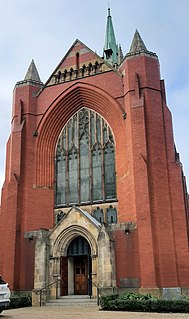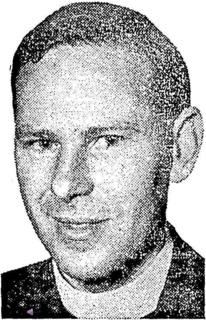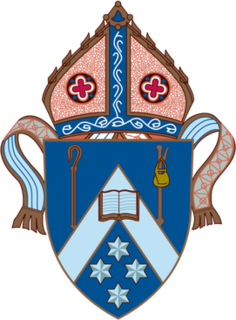
John Shelby "Jack" Spong was an American bishop of the Episcopal Church. From 1979 to 2000, he was the Bishop of Newark, New Jersey. A liberal Christian theologian, religion commentator, and author, he called for a fundamental rethinking of Christian belief away from theism and traditional doctrines.

The Diocese of Sydney is a diocese in Sydney, within the Province of New South Wales of the Anglican Church of Australia. The majority of the diocese is evangelical and low church in tradition.

The Anglican Church of Australia, formerly known as the Church of England in Australia and Tasmania, is a Christian church in Australia and an autonomous church of the Anglican Communion. It is the second largest church in Australia after the Roman Catholic Church. According to the 2016 census, 3.1 million Australians identify as Anglicans. As of 2016, the Anglican Church of Australia had more than 3 million nominal members and 437,880 active baptised members. For much of Australian history the church was the largest religious denomination. It remains today one of the largest providers of social welfare services in Australia.
Peter Frederick Jensen is a retired Australian Anglican bishop, theologian and academic. From 1985 to 2001, he was principal of Moore Theological College. From 2001 to 2013, he was the Archbishop of Sydney and Metropolitan of the Province of New South Wales in the Anglican Church of Australia. He retired on his 70th birthday, 11 July 2013. It was announced at the conclusion of GAFCON 3 on 22 June 2018 in Jerusalem that Jensen would step down as General Secretary of GAFCON in early 2019, to be succeeded by Archbishop Benjamin Kwashi, former archbishop of Jos in Nigeria.

The Australian College of Theology (ACT) is an Australian higher education provider based in Sydney, New South Wales. The college delivers awards in ministry and theology and was one of the first Australian non-university providers to offer an accredited bachelor's degree and a research doctorate. Over 22,000 people have graduated since the foundation of the college. It is a company limited by guarantee as of September 2007. On 7 October 2022 it was granted university college status by the Tertiary Education Quality and Standards Agency.

The Traditional Anglican Church (TAC), formerly the Traditional Anglican Communion, is an international church consisting of national provinces in the continuing Anglican movement, independent of the Anglican Communion and the Archbishop of Canterbury. The TAC upholds the theological doctrines of the Affirmation of St. Louis. Each of the respective jurisdictions utilizes a traditional Book of Common Prayer deemed to be free of theological deviation. Most parishioners of these churches would be described as being traditional Prayer Book Anglicans in their theology and liturgical practice. Some Anglo-Catholic parishes use the Anglican Missal in their liturgies. The TAC is governed by a college of bishops from across the church and headed by an elected primate.

Trinity College Theological School (TCTS) is an educational division of Australia's Trinity College, the oldest residential college of the University of Melbourne. It is also one of the constituent colleges of the University of Divinity. The School provides theological education and shapes men and women for ordained and lay ministry in the Anglican tradition, as well as providing other programs of study, including higher degrees by research.
Roger Adrian Herft is a former bishop in the Anglican Church of Australia. He was the Archbishop of Perth from 2005 to 2017. He was previously the Bishop of Newcastle from 1993 to 2005 and the Bishop of Waikato in New Zealand from 1986.

Sir Marcus Lawrence Loane was an Australian Anglican bishop. He was the Anglican Archbishop of Sydney from 1966 to 1982 and Primate of Australia from 1977 to 1982. He was the first Australian-born Archbishop of Sydney and also the first Australian-born archbishop in the Anglican Church of Australia. He was a prolific author and his works include several biographies.

The Anglican Church of Kenya (ACK) is a province of the Anglican Communion, and it is composed by 41 dioceses. The current Primate and Archbishop of Kenya is Jackson Ole Sapit. The Anglican Church of Kenya claims 5 million total members. According to a study published in the Journal of Anglican Studies and by Cambridge University Press, the ACK claims 5 million adherents, with no official definition of membership, with nearly 2 million officially affiliated members, and 310,000 active baptised members. The church became part of the Province of East Africa in 1960, but Kenya and Tanzania were divided into separate provinces in 1970.
Michael Bruce Curry is an American bishop who is the 27th and current presiding bishop and primate of The Episcopal Church. Elected in 2015, he is the first African American to serve as presiding bishop in The Episcopal Church. He was previously bishop of the Diocese of North Carolina.

Anglican doctrine is the body of Christian teachings used to guide the religious and moral practices of Anglicans.

The Anglican Diocese of Melbourne is the metropolitan diocese of the Province of Victoria in the Anglican Church of Australia. The diocese was founded from the Diocese of Australia by letters patent of 25 June 1847 and includes the cities of Melbourne and Geelong and also some more rural areas. The cathedral church is St Paul's Cathedral, Melbourne. The current Archbishop of Melbourne since 2006 is Philip Freier, who was translated from the Anglican Diocese of The Northern Territory, and who was the Anglican Primate of Australia from 2014 to 2020.
The Province of the Anglican Church of Burundi is a province of the Anglican Communion, located in East Africa between Tanzania, Rwanda, Kenya, and the Congo. The Archbishop and Primate of Burundi is Sixbert Macumi.

The Anglican Church in North America (ACNA) is a Christian denomination in the Anglican tradition in the United States and Canada. It also includes ten congregations in Mexico, two mission churches in Guatemala, and a missionary diocese in Cuba. Headquartered in Ambridge, Pennsylvania, the church reported 974 congregations and 122,450 members in 2021. The first archbishop of the ACNA was Robert Duncan, who was succeeded by Foley Beach in 2014.
The Anglican Church of Rwanda is a province of the Anglican Communion, covering 11 dioceses in Rwanda. The primate of the province is Laurent Mbanda, consecrated on 10 June 2018.
The Global Anglican Future Conference (GAFCON) is a series of conferences of conservative Anglican bishops and leaders, the first of which was held in Jerusalem from 22 to 29 June 2008 to address the growing controversy of the divisions in the Anglican Communion, the rise of secularism, as well as concerns with HIV/AIDS and poverty. As a result of the conference, the Jerusalem Declaration was issued and the Global Fellowship of Confessing Anglicans was created. The conference participants also called for the creation of the Anglican Church in North America as an alternative to both the Episcopal Church in the United States and the Anglican Church of Canada, and declared that recognition by the Archbishop of Canterbury is not necessary to Anglican identity.

Kay Maree Goldsworthy is an Australian bishop of the Anglican Church of Australia. She is the current archbishop of Perth in the Province of Western Australia. Upon her installation as archbishop, on 10 February 2018, she became the first female archbishop in the Anglican Church of Australia. Previously, she served as diocesan bishop of the Diocese of Gippsland in the south-eastern Australian state of Victoria.

St John's College, Morpeth, known colloquially as the "Poor Man's College, Armidale", was opened in Armidale in 1898 as a theological college to train clergy to serve in the Church of England in Australia. It moved to Morpeth in 1926 and closed in 2006.
The Church of Confessing Anglicans Aotearoa/New Zealand (CCAANZ) is an evangelical Anglican denomination in New Zealand. It is not a member of the Anglican Communion as recognised by the current Archbishop of Canterbury, but is recognised by the Global Anglican Future Conference (GAFCON). The church consists of 17 parishes, some of which consist of clergy and church members who left the Anglican Church in Aotearoa, New Zealand and Polynesia after it allowed bishops to authorise blessings of same-sex marriages, and some of which were newly established at the time of the formation of the church.













